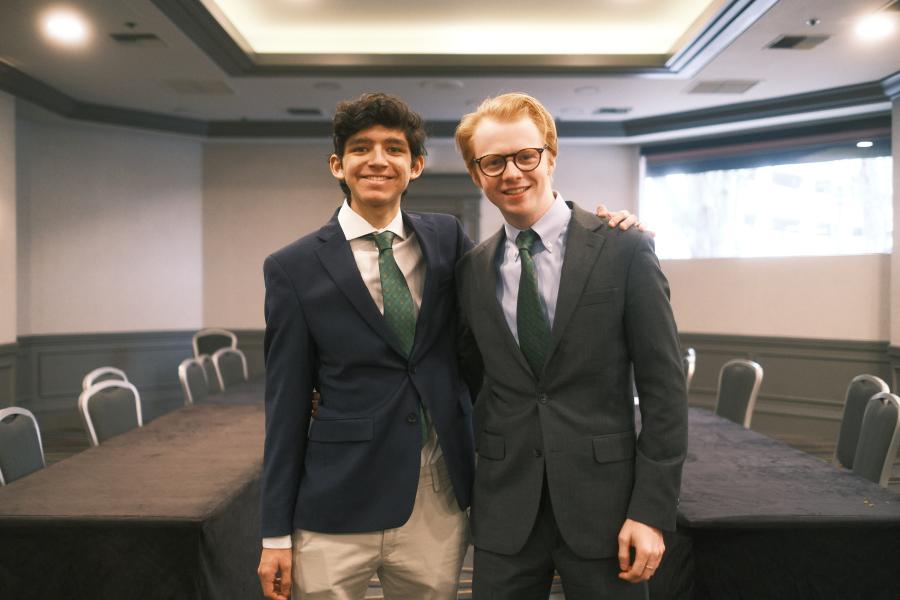Philosophy students excel at intercollegiate ethics competition
Sam Roach ’25 says that when Bernardo Jimenez ’26 approached him about forming a team to compete at the Association for Practical and Professional Ethics Intercollegiate Ethics Bowl (APPE IEP), Jimenez described the competition in terms of the Hunger Games: “Everyone’s nice to each other until you get in there, and then it’s a really competitive atmosphere.”

The competition provides a space for students to experiment with ethical analysis and argumentation. Jimenez and Roach took 10th place out of 36 teams at the national ethics bowl in Cincinnati, Ohio, in February 2024. Their accomplishment is even more impressive because their team was comprised of only two people. “And we were also the only team at nationals without a coach,” Roach said.
Their duo was unusual: ethics bowl teams usually consist of four or five members. Despite the fact that they were outnumbered by every other team at the tournament, Jimenez and Roach won most of their matches by a large margin and only lost their final match by one point. The two philosophy students made a fearsome team: “The other teams told us that that they were terrified of us,” Jimenez said.
Jimenez founded the ethics bowl team in 2022, having competed in similar tournaments in high school and wanting to continue in college. Since William & Mary did not have a team, he decided to start one. At first, he was the only member: Jimenez competed in his first regional competition by himself in December 2023, and still qualified for nationals. It was then that he asked Roach to consider joining him. “I didn’t even know that the ethics bowl existed,” said Roach, who had been busy pursuing competitive cycling in high school rather than ethics or academic teams.
The two met in a philosophy class taught by Professor Christopher Frieman (who now teaches at West Virginia University), where Jimenez became impressed by Roach’s debating skills. “I specifically asked him and chose him for this competition because I thought he was a natural,” Jimenez said. And their debating skills complement each other: Jimenez can respond quickly under pressure and Roach excels at the preparation and organization necessary for the team’s success.
The preparation is intense in the weeks leading up to the competition. “Being on a team as competitive as this requires that you sacrifice a lot of your time in the lead up to the competition,” Jimenez said. “There's a lot of writing, thinking, and arguing between the two of us, trying to figure out like which arguments work best.” Occasionally Jimenez and Roach would run their ideas by their professors, like William & Mary philosophy professor Chad Vance, in the lead up to the national round. Vance had taught Roach in an earlier class. “But overall,” Vance said, “their training for and success at the ethics bowl was all their own doing.”
At the 2024 national competition in Cincinnati, the duo competed against teams from Georgia Tech, Oklahoma Christian University, Northern Kentucky University, and the University of Georgia.
The competition consisted of several rounds. Each match involved two teams, who presented “cases,” and argued for or against the question posed within the case. One case involved the United States supplying cluster bombs to Ukraine to use in the Ukrainian-Russian war. Roach said he and Jimenez had to consider the ethics behind that issue: “Is that right or is it wrong? Are cluster bombs their only option?”
Roach and Jimenez received notice of the cases before the competition but did not know which cases they would be asked to present or which questions they would have to answer. During the match, the teams traded off presenting and responding, while a set of judges asked questions to probe their understanding. At the end of the round, the judges determined the winner. “It's like a sport,” Jimenez said, “with the adrenaline and intensity that it unlocks when you're out there.”
Associate Professor of Philosophy Aaron Griffith, the advisor to both Jimenez and Roach, said that while he was unaware of the competition before the students told him about it, he considers it a useful experience for their development as philosophy students. “Ethics bowl competitions give students an opportunity to exercise the skills they’ve learned in college,” Griffith said. “And for philosophy majors, it’s a fantastic chance to practice their debate and critical thinking skills.”
They will also continue to ponder philosophical questions as they perform research this summer under Griffith’s supervision. Roach, interested in the philosophy of the social world, will be researching social categories and their origins, while Jimenez will be investigating moral realism, the existence of morality as a real entity.
“I just get really interested by the questions that are brought up in philosophy, especially the limits of our knowledge. You know, what is real? What isn't real?” Jimenez said.
If any other students are intrigued by such questions, Jimenez and Roach encourage them to reach out: they have established an official William & Mary club – the Ethics Club – and are looking for new members.














